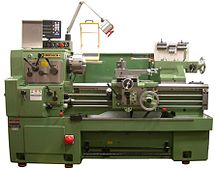lathe
English

Pronunciation
- Lua error in Module:parameters at line 95: Parameter 1 should be a valid language code; the value "UK" is not valid. See WT:LOL. enPR: lāth IPA(key): /leɪð/
Audio (US) (file) - Rhymes: -eɪð
Etymology 1
From (deprecated template usage) [etyl] Middle English lathen, from (deprecated template usage) [etyl] Old English laþian (“to invite, summon, call upon, ask”), from (deprecated template usage) [etyl] Proto-Germanic *laþōną (“to invite”), from (deprecated template usage) [etyl] Proto-Indo-European *lēy- (“to want, desire”). Cognate with German laden (“to invite”), Icelandic laða (“to attract”).
Alternative forms
Verb
lathe (third-person singular simple present lathes, present participle lathing, simple past and past participle lathed)
Etymology 2
From (deprecated template usage) [etyl] Middle English *lath, from (deprecated template usage) [etyl] Old English lǣþ (“a division of a county containing several hundreds, a district, lathe”).
Alternative forms
Noun
lathe (plural lathes)
- (obsolete) An administrative division of the county of Kent, in England, from the Anglo-Saxon period until it fell entirely out of use in the early twentieth century.
Etymology 3
From Middle English lath (“turning-lathe; stand”), from Old Norse hlað (“pile, heap”)—compare dialectal Danish lad (“stand, support frame”) (as in drejelad (“turning-lathe”), savelad (“saw bench”)), dialectal Norwegian la, lad (“pile, small wall”), dialectal Swedish lad (“folding table, lay of a loom”)—from hlaða (“to load”). More at lade.
Noun
lathe (plural lathes)
- A machine tool used to shape a piece of material, or workpiece, by rotating the workpiece against a cutting tool.
- He shaped the bedpost by turning it on a lathe.
- 1856: Gustave Flaubert, Madame Bovary, Part II Chapter IV, translated by Eleanor Marx-Aveling
- Of the windows of the village there was one yet more often occupied; for on Sundays from morning to night, and every morning when the weather was bright, one could see at the dormer-window of the garret the profile of Monsieur Binet bending over his lathe, whose monotonous humming could be heard at the Lion d'Or.
- The movable swing frame of a loom, carrying the reed for separating the warp threads and beating up the weft; a lay, or batten.
- (obsolete) A granary; a barn.
- Lua error in Module:quote at line 884: |origdate= should contain a full date (year, month, day of month); use |origyear= for year
Derived terms
Translations
|
Verb
Lua error in Module:en-headword at line 1152: Legacy parameter 1=STEM no longer supported, just use 'en-verb' without params
- To shape with a lathe.
- (computer graphics) To produce a three-dimensional model by rotating a set of points around a fixed axis.
Translations
|
See also
Anagrams
Middle English
Etymology
From Old Norse hlað (“pile, heap”). More at English, Etymology 3, above.
Noun
lathe (plural lathes)
- a barn to house livestock or store grain, etc.; a storehouse
- c. 1400, Geoffrey Chaucer, “The Reeve’s Tale”, in The Canterbury Tales:
- By Goddes herte, he sal nat scape us bathe!
Why ne had thow pit the capul in the lathe!- By God’s heart, he will not escape us both! Why didn’t you put the horse in the barn!
- English 1-syllable words
- English terms with IPA pronunciation
- English terms with audio links
- Rhymes:English/eɪð
- English terms derived from Middle English
- English terms derived from Old English
- English terms derived from Proto-Germanic
- English terms derived from Proto-Indo-European
- English lemmas
- English verbs
- English transitive verbs
- British English
- English dialectal terms
- English nouns
- English countable nouns
- English terms with obsolete senses
- English terms inherited from Middle English
- English terms derived from Old Norse
- en:Computer graphics
- Middle English terms borrowed from Old Norse
- Middle English terms derived from Old Norse
- Middle English lemmas
- Middle English nouns
- Middle English terms with quotations
